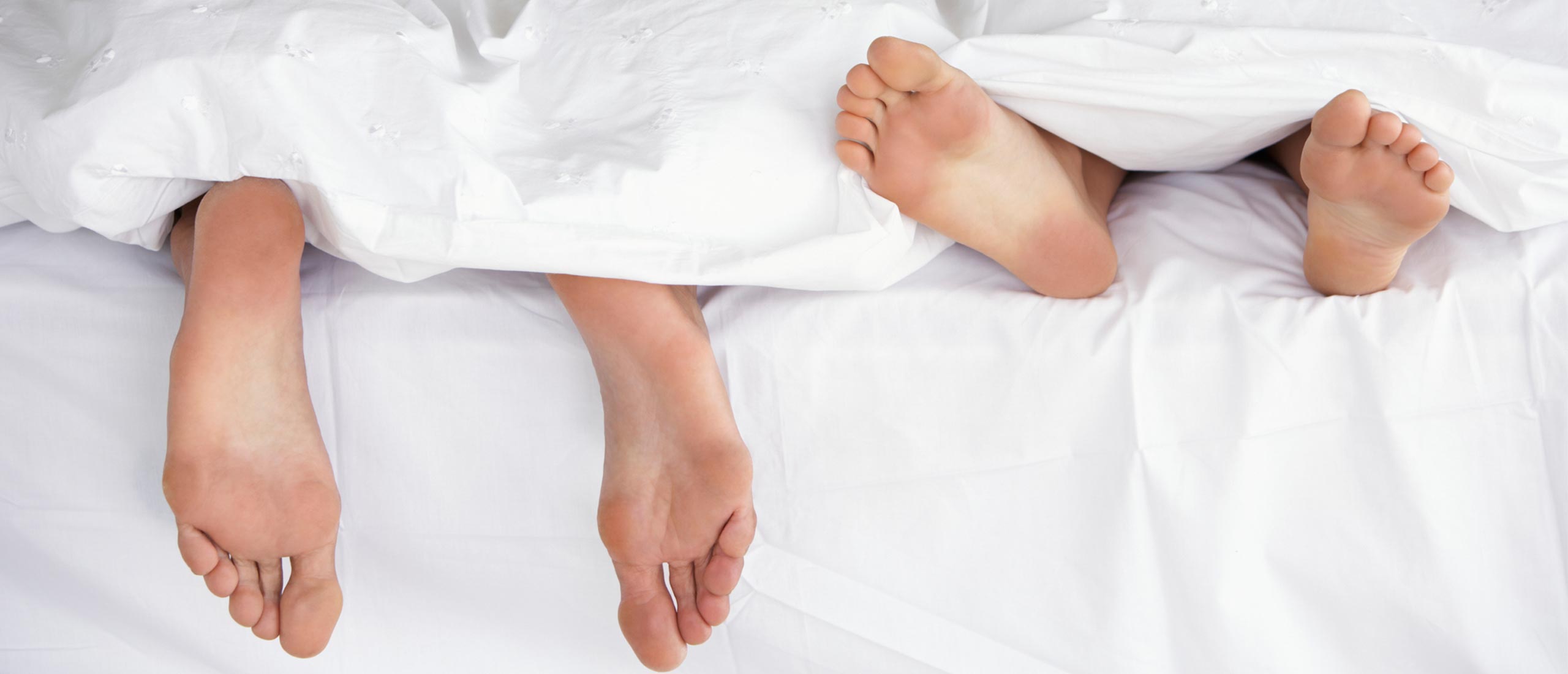My Boyfriend Has Erectile Dysfunction. What Should I Do?
Fast Facts
- When a man has ED, it can impact a couple’s sense of intimacy.
- Medical or psychological help can usually help treat erection difficulties while discussing the issue can strengthen your bond.
- An erection isn’t necessary for sexual satisfaction. Physical intimacy can take many different forms.
When a guy experiences erectile dysfunction it can stifle his self-esteem and confidence, and ratchet up his stress level, especially if he’s worried that his inability to get and keep an erection is a sign of a more serious condition.
But if your husband or boyfriend is dealing with ED, he’s not the only one. Sex is an important part of many couples’ sense of intimacy, so erection issues can dampen your bond outside the bedroom as well as in it.
The first thing to keep in mind: “Erectile dysfunction is no one’s fault,” says psychotherapist Brooke Bralove, LCSW-C, an AASECT certified sex therapist in Bethesda, Maryland.
At the same time, it’s not just a man’s issue, as it can greatly impact both partners. “The first step is to view ED as a shared couple’s issue. Meaning, you can agree upon the narrative that it’s not the fault of anyone, but you can both address it together,” she says.
The next thing to remember: There are plenty of ways to reconnect with your partner while he pursues treatment for ED. Your relationship doesn’t have to suffer if your boyfriend or husband has ED; it could actually grow stronger.
My Boyfriend Has Erectile Dysfunction—What Should I Do?
If your partner or spouse has erectile dysfunction, the most important thing is not to avoid the problem or pretend it doesn’t exist.
Here’s where to start:
Step One: Open up communication
Acknowledging the problem and how it affects both you and your partner can be awkward and emotional. But it’s important to be open and honest with each other.
Start by communicating what you want and need from the intimate part of your relationship. To begin this conversation, give your partner a warning that you two need to talk about something that might be a little uncomfortable, and schedule that in for a time that works for both of you, recommends Bralove. Then, be clear about the issue, but also approach it from a place of empathy, love, and care.
Use language that shares how ED is affecting you (e.g. I’m worried that it’s me or that I’m doing something wrong), suggest Bralove. Opening up like that and sharing those fears honestly, even though–we’ll stress it again–ED is no one’s fault–can help prevent your partner from becoming defensive during the conversation.
Next, ask him to share his own thoughts and feelings. It’s important for you to understand exactly how ED is affecting him, too, as it can be a major source of angst and cause a loss of confidence.
Step Two: Encourage him to visit a healthcare provider
Encourage your partner to make an appointment with a healthcare provider. This can help him identify the potential causes of his ED as well as solutions. Perhaps he wasn’t aware that it’s a side effect of a medication he is taking, for example, and there is an alternative available.
At this appointment, his provider can talk about potential treatment options including medications, or refer him to a urologist.
Step Three: Talk about how to maintain your connection
If intimacy is important to both of you in the relationship, know that sexual intercourse isn’t the only way to stay close.
“Erections are not required for pleasure,” says Bralove. “I love to encourage couples to imagine that they’re 15 or 16 and only making out. Taking intercourse off the table for an agreed-upon time–one week, one month, whatever works for you–is one of the best strategies to manage ED because it takes away the pressure,” she says.
You can be physically intimate in other ways, such as kissing, cuddling, giving massages, sharing sexual fantasies, watching porn, using sex toys, or reading erotica together, suggests Bralove. Focus on fun and connection together in this new view of sexual intimacy together.
Step Four: Explore sex therapy
If you need additional help, sex therapy with a qualified counselor can work with you to reconnect and develop intimacy when your boyfriend has erectile dysfunction.
“A sex therapist will not be able to fix ED, but they can help normalize the feelings that each person in the couple is experiencing and help you think outside the box about how to maintain intimacy,” says Bralove. With a sex therapist, you can both figure out what brings you pleasure outside of intercourse.
Hone’s test, which you partner can take from the privacy of your home, can analyze his testosterone levels.
How to cope with ED
- If your partner is experiencing ED, be honest about how it is effecting you and your relationship. Encourage him to do the same.
- If his erection issues happen regularly, encourage him to see a doctor.
- Seek out ways to connect beyond penetrative sex.
- Couples therapy and sex therapy can help you and your partner reconnect and find solutions.
Causes of ED
ED isn’t an “old man’s condition.” It can develop at any age, though the risk of ED increases as men become older.
While the causes can be psychological, three-quarters of men have ED due to a physical cause, such as high cholesterol, high blood pressure, diabetes, or a past injury or surgery (1). Here are four main causes of ED:
Health conditions
Type 2 diabetes, heart disease, and high blood pressure affect blood circulation throughout the body (including blood flow to the penis).
Hormonal imbalances (such as low testosterone), Peyronie’s disease (a condition where scar tissue forms in the penis and causes curved, painful erections), neurological conditions, and operations affecting the bladder, colon, or prostate can also impact the ability to gain or maintain an erection.
Medications
Common meds including blood pressure medications, antidepressants, antihistamines, and heartburn meds can cause erection problems (2).
Before stopping any prescription medications, it is important to speak with a doctor to determine whether the medication is contributing to erectile dysfunction and what the best alternative is.
Psychological factors
Erectile dysfunction can be due to psychological factors as well as physical ones. Anxiety, depression, and stress can all impact his interest in sex and libido and affect his performance (3).
Lifestyle choices
Smoking cigarettes, consuming a lot of alcohol, taking drugs (including marijuana), eating unhealthy foods, and avoiding exercise can play a role in erectile dysfunction.
What Causes ED?
- ED can be rooted in physical or psychological causes.
- Habits including smoking and excessive drinking can also play a role in erectile dysfunction.
BETTER ERECTIONS
Can a Relationship Survive Erectile Dysfunction?
Absolutely. With open channels of communication about both of your wants and needs (don’t be afraid to get really vulnerable), together you can determine if medical treatment or counseling (either one-or one or couples’ counseling) can strengthen the sexual side of your relationship.
Help For ED
When your partner has erectile dysfunction, he has a lot of options for treatment:
Oral medications
There are many different medications on the market that specifically treat erectile dysfunction. Some of these—including Viagra, Cialis, Levitra, or Stendra—belong to a class of medications called PDE5 inhibitors. They can be taken before sex and help blood flow to the penis.
Testosterone therapy
Blood tests (like the one offered by Hone) may uncover that he has low testosterone which may play a role in his ability to feel aroused. If this is the case, supplemental testosterone may help. Testosterone replacement therapy is often combined with the oral drugs above.
Injections and intraurethral medication
Medications that are inserted into his urethra or injected into the penis can also improve erections (4). Injectable alprostadil, sold under the brand names Caverject, Edex, and Prostin VR, is a common injection that can help individuals with erectile dysfunction. Some injections can be done at home (he has to do a self-injection).
Penis pump: Technically this is called a “vacuum erection device,” but these air pumps help pull blood into the penis and temporarily keep it there so he can stay hard.
Surgery: A penile implant, either silicone-based or inflatable, may be recommended in some cases.
Supplements: These are a tricky category, as the FDA warns (5) that many “male enhancement” products, including those labeled “herbal” contain hidden ingredients that are not listed on the label. There are also worries about contamination. For him, the safest route is first talking to a healthcare professional to determine his needs before taking any medications, including supplements.
FAQs About Erectile Dysfunction
Can a man with ED still have an orgasm?
Yes! He doesn’t need an erection to ejaculate or have an orgasm. One study of men attending an ED clinic found that 92 percent were able to ejaculate at least part of the time when sexually stimulated (6).
How does a man with erectile dysfunction feel?
Men who have ED report feeling stressed and anxious, insecure, less “manly,” and even worthless. When they don’t feel as if they can satisfy their partner, they may also worry that their partner will leave them, which, consequently, leads to increased anxiety about their sexual performance, research shows (7).
What age does ED become common?
As many as 30 percent of men suffer from ED, and while penis problems are more prevalent among older men, erectile dysfunction is a growing issue for younger men, too (8). Per a study in the American Journal of Medicine, only 20 percent of men between the ages of 40 and 59 said they could get a healthy enough erection for sex most of the time (9).
How many men have ED?
If your boyfriend has erectile dysfunction, you’re not the only partner navigating this relationship challenge. About 30 million men have ED, according to the National Institute of Diabetes and Digestive and Kidney Diseases.
The Bottom Line
Hone’s test, which you partner can take from the privacy of your home, can analyze his testosterone levels.
References:
1. Erectile Dysfunction [Fact Sheet] https://www.theurologyfoundation.org/urologyhealth/male-reproductive-organs/erectile-dysfunction
2. Drugs that may cause erection problems [Fact sheet] https://medlineplus.gov/ency/article/004024.htm
3. Bite-Sized Guide to Erectile Dysfunction [Fact Sheet] https://www.theurologyfoundation.org/images/2018_Bitesize_Guides/181120_-_Bitesize_Guide_to_ED.pdf
4. Patient Guide to Penile Injections [Fact Sheet] https://www.ucsfhealth.org/education/patient-guide-to-penile-injections
5. ‘All Natural’ Alternatives for Erectile Dysfunction: A Risky Proposition [Fact Sheet] https://www.fda.gov/consumers/consumer-updates/all-natural-alternatives-erectile-dysfunction-risky-proposition
6. Mostyn P, Morgan L (2013). Are men with erectile dysfunction able to ejaculate?–A survey. https://www.sciencedirect.com/science/article/abs/pii/S1752928X12002004?via%3Dihub
7. Sheng, Z. (2021), Psychological consequences of erectile dysfunction. https://wchh.onlinelibrary.wiley.com/doi/full/10.1002/tre.827
















